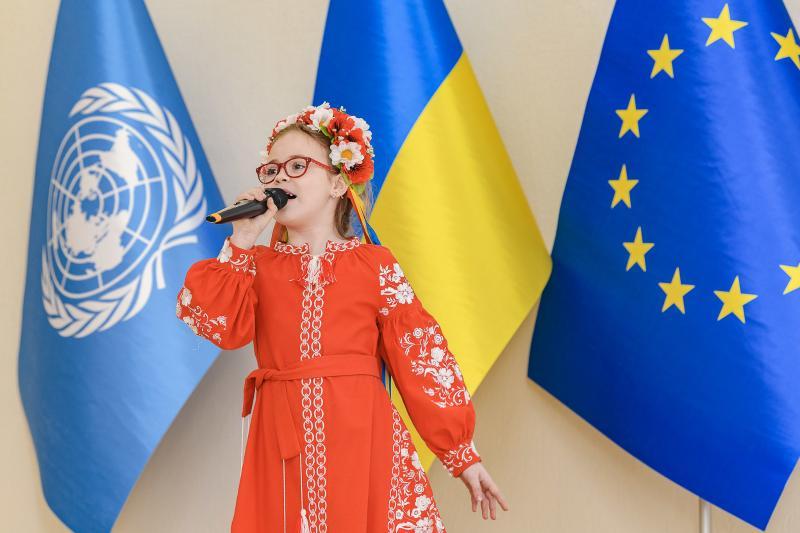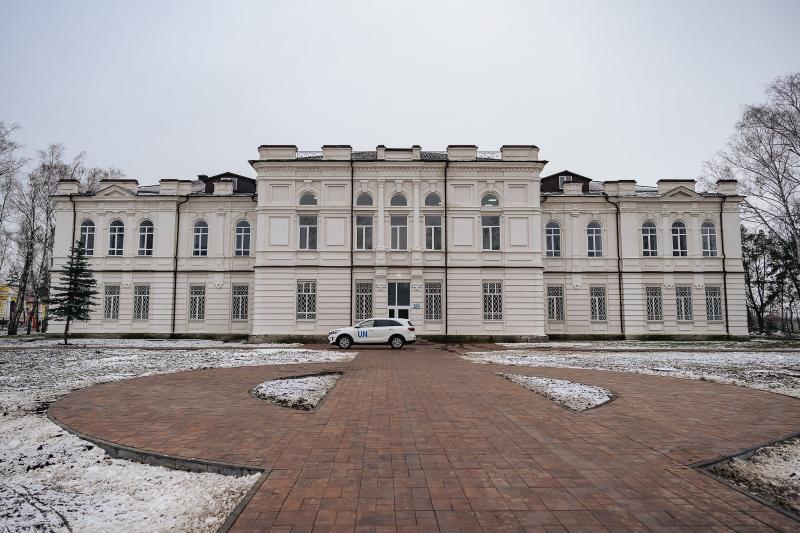A year after the Russian invasion, Ukraine mayors ask for investment to rebuild schools, educate children and repair a wide range of city services
One year ago, on 23 February, Ukrainian children came home from school, did their homework, ate dinner, prepared for the next day and then went to sleep. But for many, the next day didn’t come.
This is how Andriy Vitrenko describes the situation for many families in Ukraine. The next day just doesn’t arrive. Vitrenko, the first deputy minister of education and science in Ukraine, says that one year after Russia invaded, rebuilding damaged schools is a priority—to keep children safe and preserve their future.
“This situation of never knowing if a school is open happens every day in Ukraine,” Vitrenko says. “Education in our country takes place in harsh conditions. We need new textbooks, new chairs and desks for children, new shelters.”
Vitrenko made his remarks while visiting Luxembourg in early February for the Business Forum: Rapid Recovery of Ukraine conference, sponsored by the European Investment Bank. According to the Ukrainian government, the damage caused by Russia’s invasion has already reached more than $750 billion. About 50 participants came to the forum from Ukraine, including high-level government officials and the mayors of cities struggling to provide essential services.
At the forum, panelists discussed how to:
- speed up supplies to Ukraine
- help more refugees
- keep trains running
- help farmers grow their crops
- maintain the steel industry
- find homes for children who are missing parents or have no schools to attend
- improve the digital sector
Keeping schools open was one of the biggest issues Serhiy Solomakha, the mayor of Myrhorod in central Ukraine, dealt with after Russia invaded. Myrhorod is famous for its thermal spas. The town hosts more than 10 000 people who had to flee their homes. That’s more than 20% of its population.
“Immediately after the war started, the problem with educational institutions occurred,” Solomakha says, “but every day brought new problems — medical institutions, transport in the middle of the city, providing heating, water, housing.”
The first week of the invasion, children in dangerous areas of the country switched completely to online learning, the mayors said. A few months later, when many towns realised they could offer some education in school buildings, the schools slowly started opening again, provided if they had bomb shelters.

Ten-year-old Zlata Khytko is part of a folk-art group attending an art school that was recently repaired in Myrhorod in central Ukraine under the European Investment Bank’s Ukraine Early Recovery Programme.
Myrhorod is using money from a recovery loan signed between the European Investment Bank’s arm for operations outside the European Union, EIB Global, and Ukraine to fix problems related to the Russian conflict. Two key projects built with a €500,000 portion of the loan were a damaged centre for “aesthetic education” and a school of arts. Both buildings are used by many hundreds of students daily, including those from about 2 000 families that had to flee their homes. The buildings opened again in December 2022 and offer theatre, chorus, sewing, crafts, and a wide range of other arts and educational classes.
School is more than just a dream
Some of the workers, who repaired the schools put in new water lines, replaced windows, and fixed lighting and electricity, could not be paid for several months, because of difficulties in making payments during the war. A lot of the workers were women, because the men were serving in the military.
“We didn’t want this new centre to be just a dream,” Mayor Solomakha says. “Despite everything we’re going through, people came together so that children can study and get an education.”
Artem Semenikhin, the mayor of Konotop, a small city in northeastern Ukraine, says that when looking to the future and deciding how to repair the country, it is important to remember that the war didn’t really start a year ago.
“The war in our country has been going on for more than eight years,” he says, referring to Russia’s invasion of Ukraine’s Crimea peninsula. “But after the start of the full-scale invasion, people woke up, people changed, people behaved differently. I am glad that people have opened their eyes. This comes at an extremely high price for our society, but it made us really begin to appreciate freedom.”
Semenikhin and Serhii Morhunov, mayor of Vinnytsia in west-central Ukraine, say the war has made more Ukrainians focus on the Russian problem –something that many tried to ignore in the past, while focusing on more local concerns in their daily lives.
“War has a negative impact on any resident of any country and city,” Morhunov says. “But if we talk about Ukrainians, first of all, the war consolidated the whole society. And, more than ever, everyone was ready to fight the enemy who attacked our country.”
Adds Semenikhin, “Before February 24, some people lived mundanely: they went to work, came home, took care of children, kindergarten. It was a routine, and people did not pay attention to other things taking place in the world. Now every family, every child does.”

The art school that opened in December 2022 in Myrhorod in central Ukraine financed by the EIB Ukraine Early Recovery Programme.
The war has especially changed living conditions for children, who are the hardest to protect, the mayors say.
“What hurts the most is children,” Semenikhin says. “They suffer from the war. They have to live with it. Children even play at checkpoints: they set up roadblocks, stop cars, say some password in Ukrainian, collect money for the army, and then transfer this money to funds to purchase various equipment for their towns.”
Children could fall behind for years
Children are in danger of falling way behind, and consequently the country will suffer for a long time, says Solomakha, the mayor of Myrhorod.
“We must not lose a generation now,” he says. “If we do not educate this generation of children during the current war, then in five to 10 years we will have many other problems. Children must have certain knowledge and skills, in order to build Ukraine in the future.”
Semenikhin, the mayor from Konotop, echoed the feelings of Vitrenko, the education first deputy minister, when asked to list the main needs of Ukrainians today. He said providing shelters for those without homes is a top priority. After that, the mayors listed fresh food, electricity generators, more fuel, more weapons, fighter jets.
“The most important thing is bomb shelters, where people can stay for a long period of time to save themselves,” Semenikhin says. “A shelter within easy reach saves not just dozens, but hundreds, thousands of people. Not enough attention is paid to this problem. The shelter facilities are the greatest need. The most important thing.”
Building shelters requires people to do the work, but the mayors said they also need more investment and flexible repayment terms. “If we are talking about reconstruction and restoration, then we also need more expertise –technical expertise, economic expertise – so that we can carry out this work according to high European standards,” says Morhunov, the mayor of Vinnytsia.
Three main elements of the European Investment Bank’s package for Ukraine involve expert technical assistance from the advisory services team, quick decisions on investments by loan officers and project engineers, and flexible financial terms. Since the start of the full-scale Russian invasion of Ukraine, working hand in hand with the European Commission and the government of Ukraine, the Bank has mobilised €1.7 billion to help the country.
The mayors are optimistic that the war will end in Ukraine’s favor, but none can predict when this will happen.
“I would really like everyone to understand that Ukraine is no longer the country it was before February 24, 2022,” says Mayor Semenikhin. “Today, we are fighting for every square centimetre of our territory, our land. We value it, and we feel we are fighting for freedom for the whole civilized world.”
